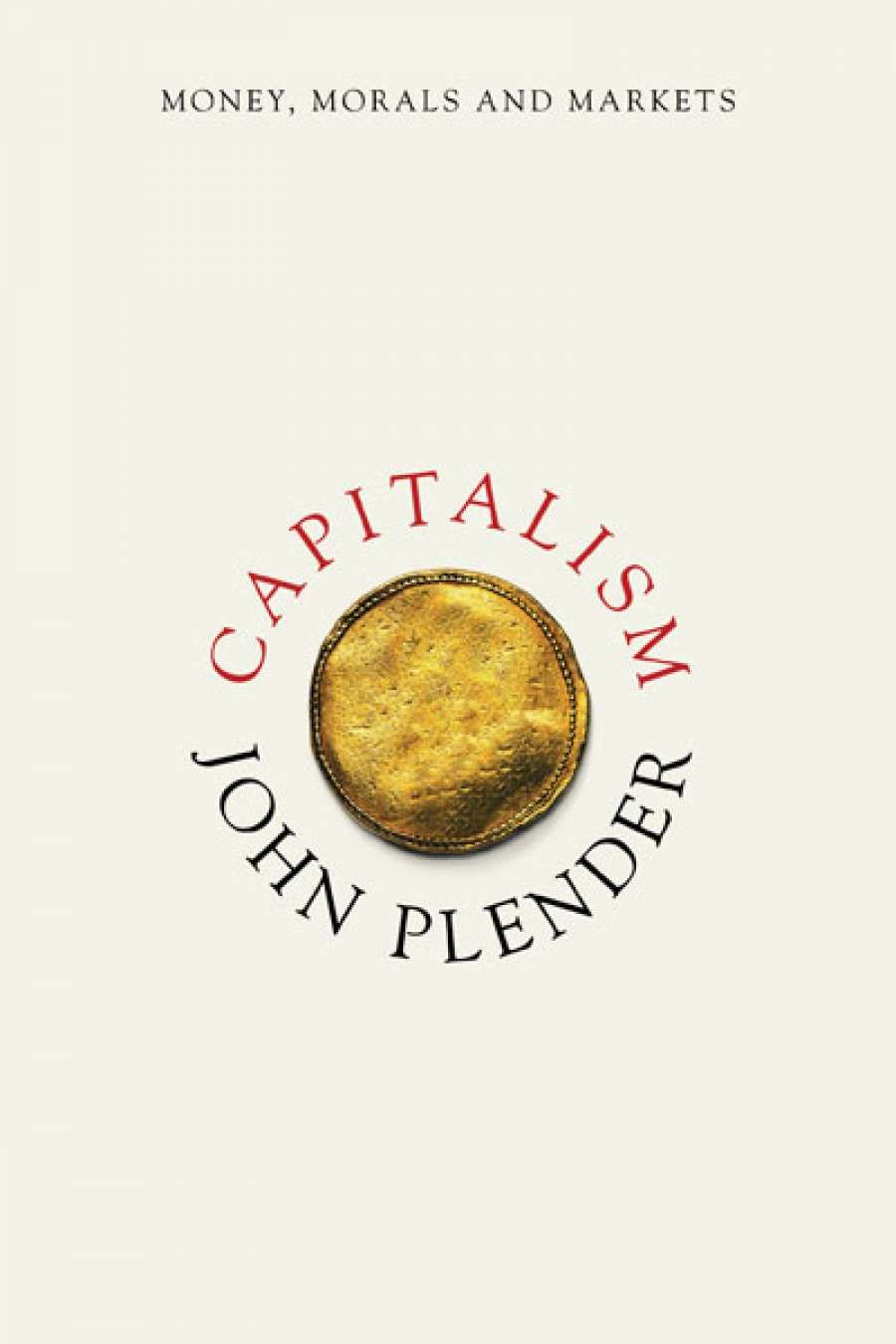
- Free Article: No
- Contents Category: Economics
- Custom Article Title: Peter Acton reviews 'Capitalism' by John Plender
- Book 1 Title: Capitalism
- Book 1 Subtitle: Money, Morals and Markets
- Book 1 Biblio: Biteback Publishing (NewSouth), $39.99 hb, 349 pp, 9781849548687
Topics are explored in accessible, often pithy, terms. A wealth of quotations illustrates differing attitudes on each of them, so that each chapter is effectively a debate conducted by some of the world's most eloquent voices: the pernicious effects of trade are strongly stated by Aristotle, Thomas Aquinas, and Charles Davenant, but those who saw it as a force for good, promoting world peace as well as material comfort, included Hobbes, Locke, Defoe, Steele, Addison, Montesquieu, and, in typic-ally gorgeous verse, Alfred Tennyson. Current concerns about the risk posed by inequality to social cohesion follow a tradition that includes Aristotle, Machiavelli, and Montesquieu again. There is little to be said about gold from an economic point of view – it is simply an investment vehicle with no utility except as a hedge – but many of those who have said it did so eloquently. In some cases, the authors quoted tend to fall on one side of the argument: Plender cites hostile comments on banking from Aristotle, Cicero, Swift, Dickens, and Ogden Nash, but the balancing and informative counter-argument is largely his own. Similarly thoughtful analyses explore the ideal role for central banks, misguided laments for the decline of manufacturing, the forces behind market bubbles, and the logic of investing in gold.
A journalist with the Financial Times, and formerly with the Economist, is hardly likely to condemn capitalism outright. Besides applauding its success in lifting billions out of poverty in recent decades, Plender opines that the collapse of the Soviet Union has left no plausible alternatives. His editorial commentary, though, like his selection of citations, is far from one-sided. As he showed in Going off the Rails: Global Capital and the Crisis of Legitimacy (2003), he has a sharp eye for the system's chronic malignancies and regular health crises. In his view, well supported here by his selection of texts, capitalism's two major drawbacks are instability – which threatens everything from jobs, through social cohesion to the environment – and questionable ethics. He sees these problems as endemic and anticipates that before long we will experience another major economic collapse that will be even harder to recover from than the one that has held back global growth since 2008.
'Plender has given us a thematic primer in economic thought'
On this account, capitalism is its own worst enemy. Plender observes that its tendency to excess is not only a source of social resentment but invites regulations that restrict growth. His attribution of blame could be a sound bite from a Michael Moore film: 'bankers have undoubtedly done their best to give the system a bad name. The extraordinary scale on which big banks have been rigging interest rates and foreign exchange markets and ripping off their customers is almost beyond comprehension.' He notes that the cost of rescuing banks from the mistakes they made in the first few years of this century amounted to twenty-five per cent of global output. He is critical of the Chicago school, the efficient market hypothesis, and the unreality of the assumptions underpinning neo-liberal economics, and scathing about investment institutions and their lack of concern for those with whose money they are charged – 'an egregious corpor-ate governance vacuum'. He questions austerity strategies and is cautiously sympathetic to debt forgiveness. (In connection with the current Greek crisis, he reminds us that Germany had ninety-three per cent of its debt written off at the end of World War II, with the rest being put on easier terms.) On other issues he is less forthcoming; having set out the arguments, he refrains from taking sides in the major current debates on, for instance, Thomas Piketty's work, the appropriate level of taxation, and the viability of the euro.
Any selection like this must be subjective and it is easy to find omissions. Plender cites Virginia Woolf but not Tom Wolfe, Wall Street but not Inside Job, Richard Wagner but not Billy Bragg. But one can hardly complain about the wealth of material he does include, and the reader is at liberty to add favourites to either side of the many debates.


Comments powered by CComment